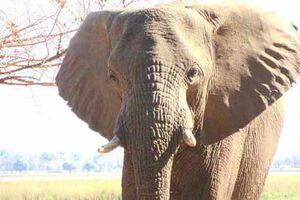Elephant, man!
His close encounter with an elephant in Zambia left our (not so) intrepid wildlife reporter Tim Earl shaken... and stirred...

His close encounter with an elephant in Zambia left our (not so) intrepid wildlife reporter Tim Earl shaken... and stirred...
I LIKE a snooze after lunch, particularly when leading tours.
It is a little like shutting down and restarting a computer – booting up the brain for the afternoon.
In that respect I take after my late grandfather, Fred Wallis senior. Indeed, my earliest recollections of this newspaper are seeing it draped over his head as he napped for 20 minutes after a good lunch.
'Don't wake grandpa,' was the refrain and we tiptoed around, whispering in hushed tones.
When I am away leading tours it is common for sniggers and clicks to wake me: my clients find it amusing to take pictures of their great and glorious leader asleep under his bush hat.
I warn them not to bother, but the pictures are inevitably sent to the Travelling Naturalist office to join scores of others sent in with a note: 'Your leader hard at work,' or similar.
The girls have a large folder to keep these pictures safe. I suspect they will all come out to form a compendium marking my retirement, but time will tell.
It was thus something of a novelty to be woken in a rather different fashion a few days ago.
'Wake up sir,' the deep voice said, penetrating my consciousness, 'there's an elephant coming this way.'
I opened my eyes and followed the waiter's pointing finger. Fifty metres away a bull elephant was emerging from the bush, closing in fast.
Leaping to my feet I followed my escort back to the dining area I had vacated earlier at the top of a flight of concrete steps. It was the most unusual alarm call I had ever experienced.
Potato Bush Camp is in the Lower Zambezi national park, in Zambia. Its tents are erected on concrete platforms that are just too high for an elephant to step up onto.
They overlook the mighty Zambezi River and in November elephants can frequently be seen wading out to islands where they graze on reeds and grass, the only good food left for pachyderms at the end of Zambia's dry season.
Hundreds come down into the park from the vast escarpment onto which it backs. This is the great Rift Valley of Africa, which stretches all the way northwards into Egypt and even through Israel, giving homes to the Sea of Galilee and Dead Sea.
All food has gone by the end of the dry season and the elephants follow ancestral routes over the hills and down to the banks of the Zambezi.
Elephants, hippos and buffaloes risk attack by huge crocodiles to access islands in the main channel.
Others, like the bull that disturbed my slumbers, prefer to graze on trees and shrubs in the camps (there are three in the area).
Their diets are usually leaves and shoots emerging in anticipation of the imminent rains, but the animals, along with troops of baboons, also have a taste for acacia seeds.
The elephant that had established our camp as his temporary home had a habit of shaking the trees to dislodge seed pods, which were then gently and delicately picked up and eaten.
My first encounter with him was when I was being shown the facilities of the tent that was to be my home for the next four nights.
'Cheeky', as he was nicknamed, appeared at the window. A strategically placed bush which gave privacy to the tent was being devoured, branch and twig, by the bull. It flapped its ears angrily every time anyone went near the window.
This seemed a happy encounter with local wildlife, but that view was not endorsed by the manager of sister establishment Sausagetree Camp 100 metres away, who was left severely bruised when the elephant struck him on the chest and arm with its trunk.
Staff in both camps took the danger extremely seriously and it is certain that my 94-year-old companion would have been killed had the beast swiped her with the same force.
We were instructed to walk to the dining area during the day only after checking to see that none of the many elephants that strolled through the camp regularly were near.
At night we had to remain in the tent until accompanied by staff, who came to fetch us for meals or drinks.
My second encounter with the bull elephant was a day later when, as I was reading, having woken from my post-lunch snooze in a chair on our patio, the animal walked silently around the corner and passed me no more than 18 inches away.
Whether he had seen me I do not know, as the bull continued around the tent and disappeared after investigating the shower, which was open-ended.
It was a little like sitting on the kerb when a double-decker bus goes past. Phew!
Our worst encounter was on the third day when the elephant appeared late in the afternoon.
Spotting me on the patio, the bull decided to assert his authority to be there (which, incidentally, I did not doubt in the slightest) and rather impolitely asked me to leave.
That was my interpretation of his truculent stance, extended ears and the loud trumpeting he made.
I stood up from my chair, which was perhaps a mistake. With a tiny plunge pool between us the animal gave another call and swung his trunk at me (the same manoeuvre that had injured the manager).
I was showered with the contents of its trunk – bits of earth, stones and elephant snot – but otherwise quite safe.
Frustrated, the bull walked to the end of the patio and, tucking his head under the heavy awning, he attempted to step up.
This was supposed to be impossible for an elephant.
In fairness, he thought better of it, walking out backwards after his head lifted the tent's awning from its heavy wooden support pillars. Happily, the awning dropped back onto its support.
I was inside the tent by this time, bravely ready to do a bunk out of the back had the animal come any further.
There was no need to worry.





